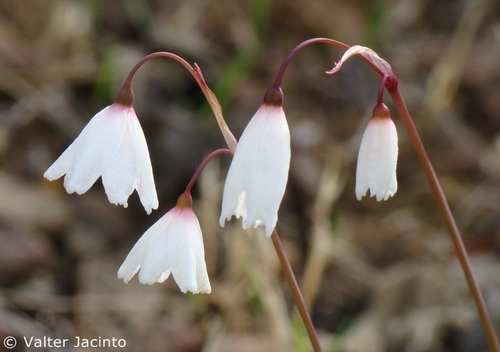Autumn Snowflake
Search
Wikipedia
| Acis autumnalis | |
|---|---|

| |
|
Scientific classification | |
| Kingdom: | Plantae |
| Clade: | Tracheophytes |
| Clade: | Angiosperms |
| Clade: | Monocots |
| Order: | Asparagales |
| Family: | Amaryllidaceae |
| Subfamily: | Amaryllidoideae |
| Genus: | Acis |
| Species: |
A. autumnalis
|
| Binomial name | |
|
Acis autumnalis | |
| Synonyms[1] | |
| |
Acis autumnalis, the autumn snowflake,[2] is a species of flowering plant in the family Amaryllidaceae. A short bulbous perennial, it is found on the western shores of the Mediterranean, from Portugal, Spain and Morocco to Sicily and Tunisia.
Description
Acis autumnalis grows to about 10–15 cm tall. Its leaves are narrow, often seeming to form tufts, and usually only appear after the flowers. A. autumnalis flowers in late summer to autumn, with one to four flowers per stalk, each carried on a long, thin pedicel. The white tepals are 9–14 mm long, pinkish at the base, less commonly all pink. The outer three tepals are toothed. There is normally only one spathe at the base of the flowers.[2][3]
Taxonomy
Acis autumnalis was first described by Carl Linnaeus in 1753, as Leucojum autumnale.[4]Richard Anthony Salisbury in 1807 in The Paradisus Londinensis was the first to suggest putting Leucojum autumnale in a new genus, Acis,[5] although he did not actually use the name Acis autumnale, which was first published in 1829 by Robert Sweet.[6] Most later botanists did not accept the distinction between Leucojum and Acis.[3][7] The genus, and with it Acis autumnalis, was reinstated in 2004, after it was determined on morphological and molecular grounds that, when broadly defined, Leucojum is paraphyletic.[7]
The species has been divided into a number of varieties, differing in minor characters. For example, A. autumnalis var. diphyllum from North Africa has two spathes.[3] The World Checklist of Selected Plant Families regards all the varieties as part of a single species.[1]
Distribution and habitat
Acis autumnalis is found on both sides of the western Mediterranean. In Europe, it is native to Portugal, Spain (including the Balearic Islands), Sardinia and Sicily. In north Africa, it is native to Morocco, Algeria and Tunisia.[1] It occurs in rocky places and stony hillsides.[2][3]
Cultivation
Acis autumnalis is grown as an ornamental plant. It is recommended for light soils in sheltered positions in full sun. Some forms in cultivation increase rapidly from seeds, others from bulb division.[3] The species has gained the Royal Horticultural Society's Award of Garden Merit.[8]
References
- ^ a b c d "Acis autumnalis", World Checklist of Selected Plant Families, Royal Botanic Gardens, Kew, retrieved 2017-05-27
- ^ a b c Grey-Wilson, Christopher; Mathew, Brian & Blamey, Marjorie (1981), Bulbs : the bulbous plants of Europe and their allies, London: Collins, ISBN 978-0-00-219211-8, p. 134 (as Leucoium autumnale)
- ^ a b c d e Mathew, Brian (1987), The Smaller Bulbs, London: B.T. Batsford, ISBN 978-0-7134-4922-8, p. 120 (as Leucojum autumnale)
- ^ "IPNI Plant Name Query Results for Leucojum autumnale", The International Plant Names Index, retrieved 2017-12-03
- ^ Salisbury, R.A. & Hooker, W. (1805–1808), The Paradisus Londonensis : or Coloured Figures of Plants Cultivated in the Vicinity of the Metropolis, 1, London: W. Hooker (printer D.N. Shury), t. 74, doi:10.5962/bhl.title.53520, OCLC 1864969
- ^ "IPNI Plant Name Query Results for Acis autumnalis", The International Plant Names Index, retrieved 2017-12-03
- ^ a b Lledó, Ma D.; Davis, A.P.; Crespo, M.B.; Chase, M.W. & Fay, M.F. (2004), "Phylogenetic analysis of Leucojum and Galanthus (Amaryllidaceae) based on plastid matK and nuclear ribosomal spacer (ITS) DNA sequences and morphology", Plant Systematics and Evolution, 246 (3–4): 223–243, doi:10.1007/s00606-004-0152-0, S2CID 43826738
- ^ "Acis autumnalis", RHS Plant Selector, retrieved 2020-02-23



